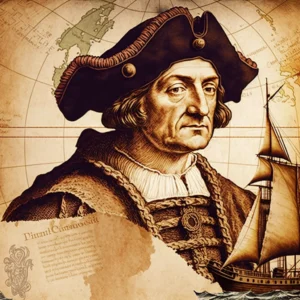
The Background of Columbus’ Voyage in 1492
To understand the impact of Christopher Columbus’ voyage, we need to look at the time in which it happened. In the late 1400s, European countries were exploring and expanding, trying to find new lands and resources. Columbus, an Italian explorer working for Spain, set out to find a new way to reach the East Indies to create new trade routes and help Spain grow its power.
How Columbus’ Voyage Changed Trade and the Economy
One of the most important effects of Columbus’ voyage was the way it changed global trade and economies. By discovering the Americas, Columbus opened up new trade routes. Europe gained access to new goods like tobacco, cocoa, and potatoes. These new products boosted the European economy, created new industries, and helped many people become wealthier.
However, the effects weren’t all positive. The discovery of the Americas also led to the beginning of the transatlantic slave trade. Europeans began using enslaved Africans to farm crops like sugar and tobacco in the New World. This cruel system had long-lasting consequences and shaped the economies and societies of both Europe and the Americas for hundreds of years.
How Columbus’ Voyage Changed Politics and Power
Columbus’ voyage also changed the political landscape of the world. Once the Americas were discovered, European countries like Spain, Portugal, and England started competing to control the new lands and resources. This competition led to the colonization of the Americas, where European powers established colonies to gain more influence.
For the indigenous peoples of the Americas, colonization was devastating. Many were forced to leave their homes, enslaved, or killed. Colonization also shifted global power, helping European empires rise and pushing non-European peoples into a lower status.
How Columbus’ Voyage Affected Cultures
Columbus’ voyage had a major effect on cultural exchange between Europe and the Americas. When Europeans arrived in the New World, they encountered new cultures and ways of life. This led to an exchange of ideas, technologies, foods, and traditions between Europe and the Americas.
This exchange had both positive and negative results. On the one hand, it brought new ideas and innovations to both sides. But it also introduced diseases, violence, and oppression, which greatly harmed indigenous cultures. Many native languages, customs, and traditions were lost forever due to European colonization.
Today, the blending of European and indigenous cultures is a key part of the identity of many Latin American countries. However, we cannot ignore the damage that colonization caused to native peoples.